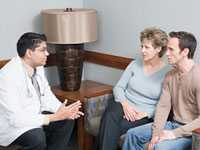Questions to Ask Your Doctor About Colorectal Cancer

Know Before You Go
The U.S. Preventive Services Task Force recommends that adults age 50 to 75 be screened for colorectal cancer. The decision to be screened after age 75 should be made on an individual basis. If you are older than 75, ask your doctor if you should be screened. People at an increased risk of developing colorectal cancer should talk to their doctors about when to begin screening, which test is right for them, and how often to get tested.
Several screening tests can be used to find polyps or colorectal cancer. The benefits and risks of these screening methods vary. Discuss with your doctor which test is best for you, and check with your insurance provider to find out which tests are covered by your insurance plan, and how much you will have to pay. Medicare helps pay for colorectal cancer screening.
Ask Your Doctor
Do I need to get a screening test for colorectal cancer?
- What screening test(s) do you recommend for me?
- How do I prepare? Do I need to change my diet or my usual medication schedule?
- What’s involved in the test? Will it be uncomfortable or painful?
- Is there any risk involved?
- When and from whom will I get results?
If you’re having a colonoscopy or sigmoidoscopy, you will want to know—
- Who will do the exam?
- Will I need someone with me?
If You’re at Increased Risk
Some people are at increased risk because they have inflammatory bowel disease, a personal or family history of colorectal polyps or colorectal cancer, or genetic syndromes like familial adenomatous polyposis (FAP) or hereditary non-polyposis colorectal cancer (also known as Lynch syndrome). These people may need to start screening earlier than age 50. If you believe you are at increased risk, ask your doctor if you should begin screening earlier than age 50.
If You’re Having Symptoms
Tell your doctor if you have any of these symptoms—
- Blood in or on your stool (bowel movement).
- Stomach pain, aches, or cramps that do not go away.
- Losing weight and you don’t know why.
These symptoms may be caused by something other than cancer, but the only way to know what is causing them is to speak with your doctor about them.
- Page last reviewed: March 23, 2017
- Page last updated: March 23, 2017
- Content source:


 ShareCompartir
ShareCompartir